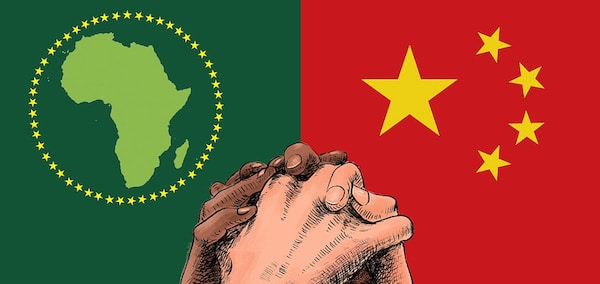The U.S. can’t seem to understand that the rest of the world, including Africa, doesn’t like to be pushed around. African nations’ refusal to reinforce U.S. foreign policy in the UN General Assembly is a case in point. During the Assembly’s February 16 vote on a resolution “deploring” Russia’s action in Ukraine, nearly half the nations who abstained were African, 15 of the 32, although only 54 of the UN’s 193 member nations are African. Those abstaining were Algeria, Angola, Burundi, Central African Republic, Republic of Congo, Ethiopia, Gabon, Guinea, Mozambique, Namibia, South Africa, Sudan, Togo, Uganda, and Zimbabwe.
No African nations were on the list of nations introducing the resolution, and two of the seven who voted no—Eritrea and Mali—were African.
In 2022, South African Minister of International Relations and Cooperation Naledi Pandor deplored Congressman Gregory Meeks’s Countering Malign Russian Activities Act as “a totally unwarranted” intrusion that goes against international law, and the South African Development Corporation joined South Africa in that sentiment. The House had passed the Act on a voice vote, but the Senate at least seems to have realized that it was counterproductive, and not brought it up.
Nevertheless, on February 21, Republican legislators in the House introduced “H.Res.145 -Opposing the Republic of South Africa’s hosting of military exercises with the People’s Republic of China and the Russian Federation, and calling on the Biden administration to conduct a thorough review of the United States-South Africa relationship.”
The joint military exercises proceeded as planned, and security analysts rightly described the proposed U.S. legislation as an act of desperation.
U.S. uses trade preference to bully Ethiopia, China steps up
On January 1, 2022, the U.S. canceled Ethiopia’s eligibility for the African Growth and Opportunity Act (AGOA) because of alleged human rights violations during Ethiopia’s Tigray War, a civil conflict waged from November 2020 to December 2022. The act had granted tariff free access to the U.S. market to firms manufacturing in Ethiopia.
At the outset of the war, Ethiopia had the fastest growing economy on the African continent and the tariff free access had been stimulating the growth of its industrial capacity and generating foreign exchange. Two international firms, Hela Indochine Apparel PLC and Submarine Garment, left Ethiopia’s industrial park in Addis Ababa after the tariff free access was suspended, costing 5,000 Ethiopians, mostly poor women, their jobs.
The war ended in December, when federal forces defeated the Tigray People’s Liberation Front (TPLF), a longtime U.S. proxy, but the U.S. is refusing to restore Ethiopia’s tariff free access unless the country agrees to cooperate with a UN investigation of war crimes.
International criminal investigations and prosecutions are typically a form of judicial imperialism designed to advance the foreign policy objectives of the U.S. and its Western allies. Ethiopia has established its own process for investigating and prosecuting war crimes and moved to have the UN investigation terminated.
Meanwhile, as the U.S. attempts to use AGOA as a carrot and stick to impose its will on Ethiopia, China has stepped up to offer Ethiopia tariff free access to its own, much larger market. In early March, Chinese Global Television Network host Zhong Shi spoke with Ethiopian Finance Minister Ahmed Shide.
Chinese Global Television Network host Zhong Shi: China will grant zero tariff treatment to 98% of taxable items originating from Ethiopia starting March 1. How important is that for Ethiopia? And what are your expectations when that kicks off?
Ethiopian Finance Minister Ahmed Shide: First of all, we would like to commend the leadership of China under President Xi Jinping for offering this zero tariff treatment for Ethiopia’s taxable export items, and also other countries. This shows very timely, and the proper decision from the People’s Republic of China to advance our cooperation. This will also facilitate export from Ethiopia to China, which is very, very important and the investment we made in the past, the fundamental objective was to enhance our production capacity. And this new decision is fully welcomed by our prime minister and the government and the companies, Ethiopian companies and international companies who are in Ethiopia, will benefit from this.
And as a result of this, the production capacity in Ethiopia will be enhanced, and particularly at this point, where there is multiple challenges of COVID, International price increase due to conflict in Ukraine, climate related problems we have of drought, this will support a Ethiopia’s growth and development and as a solidarity, the purpose of political China has shown for the spirit is very useful and we are very thankful of this.
China is already Ethiopia’s largest trading partner, source of investment, and project contractor. It is constructing the railroad between Ethiopia’s capital Addis Ababa and Djibouti’s ports on the Gulf of Aden and Indian Ocean, at the interface of Africa, the Middle East, and Asia.
With its economy ravaged by the U.S.’s two-year proxy war, Ethiopia has also turned to China for debt relief, which it hasn’t received from the IMF, where the U.S. has veto power, or from the G20.
Imagining that it is still in an age of economic dominance rather than competition with the world’s other great powers, the U.S. is shooting itself in the foot in Africa again.

